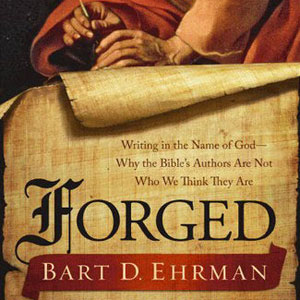Book Review: Forged: Writing in the Name of God—Why the Bible’s Authors Are Not Who We Think They Are

In his latest book Forged: Writing in the Name of God—Why the Bible’s Authors Are Not Who We Think They Are, University of North Carolina Professor Bart Ehrman continues to bring to the general public the real history of the making of the Bible that he first explored in 2007’s Misquoting Jesus and last year’s Jesus, Interrupted.
The basic premise of Forged is something critical Biblical scholars have long known–most of the books of the Bible were not written by the people whose names are on them. A very few were, but others, such as Matthew, Mark and Luke, probably represent early accounts of the story of Jesus later attributed to these early apostles. Call these misattributions. And a significant number of the books of the Bible are simply outright forgeries, written by someone falsely claiming to be an apostle or other important Church leader.
But Ehrman’s main argument in the book is not that these are forgeries. As he points out, Biblical scholars have long known these books were not, or at least probably were not, written by the named author. What Ehrman takes issue with is that the more common scholarly rationalization of theses forgeries is just plain wrong. Biblical scholars have for many years stated that while many of the books of the Bible were not written by who they say they are, this was a normal practice at the time they were written, that people wrote these books in the name of Apostles or other leaders as a way of arguing for a particular view, or paying homage to that person, and that this sort of “pseudonymous” writing was a widely accepted practice.
Ehrman has researched this scholarly thesis and found it is simply not supported by the historical record. Truly pseudonymous writings are ones where a false name may be used, but the name used is otherwise unknown as well–a hiding of the identity of the author. Instead, what the Biblical forgers did was use a well-known name in order to pass off their own writings as authentically those of the Apostle—“forged” rather than “pseudonymous”–and that this type of forgery was strongly condemned, even in those far distant times.
The reasons for forgeries varied. Some were to push a particular viewpoint of early church doctrine, others were simply done for the money being offered for original testimonies. No matter what the reasons, Ehrman is vehement in both his scholarship and his argument that these are nothing less than forgeries—forgeries that were unacceptable then as well as now—and modern scholarship should acknowledge this.
Ehrman’s strength has always been taking generally accepted academic scholarship and presenting it to the general public in a lively, readable, engaging fashion. He outlines the solid scholarship behind it, without getting bogged down in scholarly sludge. Forged is no exception. Highly readable, he uses personal stories of his own history of Biblical research (he started to research Biblical history becauseof his faith that it would show the truth of the Bible stories, and his research lead to his own present agnosticism) sparingly but with great effect.
But Forged is, in some ways, a follow up to Jesus, Interrupted and Misquoting Jesus. In Forged he often sidesteps a line of argument that would naturally follow the flow of his reasoning by stating he doesn’t want to rehash information and argument already presented in those books. But for those who have not read these two excellent books, you would be better off to start with them before beginning Forged. But even on its own, with its solid researched and straightforward, easy-going style, Forged is still a fascinating read that I highly recommend.
